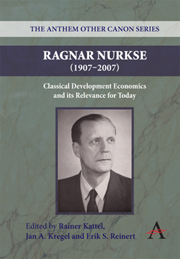Book contents
- Frontmatter
- Contents
- Preface
- Title in the series
- 1 The Relevance of Ragnar Nurkse and Classical Development Economics
- 2 Life and Time of Ragnar Nurkse
- 3 Nurkse and the Role of Finance in Development Economics
- 4 Early Development Theory from Sun Yat-sen to Ragnar Nurkse
- 5 The Roots of Unequal Exchange: Mihail Manoilescu and the Debate of the 1930s
- 6 Nurkse and the Early Latin American Structuralists: A Reflection on Development Theory, Industrialization and their Relevance Today
- 7 Lewis, the Long Wave and Industrialization in the Periphery
- 8 Ragnar Nurkse and the Law & Economics of Development
- 9 Ragnar Nurkse's Development Theory: Influences and Perceptions
- 10 Nurkse meets Schumpeter: Is Microfinance a ‘Silver Bullet’ to Economic Development?
- 11 Stockpiling of International Reserves and Development: a Misguided Link
- 12 International Currency Experience and the Bretton Woods System: Ragnar Nurkse as Architect
- 13 Some Reflections on Nurkse's Patterns of Trade and Development
- 14 India and Development Economics: External Influences and Internal Responses
- Notes
5 - The Roots of Unequal Exchange: Mihail Manoilescu and the Debate of the 1930s
Published online by Cambridge University Press: 05 March 2012
- Frontmatter
- Contents
- Preface
- Title in the series
- 1 The Relevance of Ragnar Nurkse and Classical Development Economics
- 2 Life and Time of Ragnar Nurkse
- 3 Nurkse and the Role of Finance in Development Economics
- 4 Early Development Theory from Sun Yat-sen to Ragnar Nurkse
- 5 The Roots of Unequal Exchange: Mihail Manoilescu and the Debate of the 1930s
- 6 Nurkse and the Early Latin American Structuralists: A Reflection on Development Theory, Industrialization and their Relevance Today
- 7 Lewis, the Long Wave and Industrialization in the Periphery
- 8 Ragnar Nurkse and the Law & Economics of Development
- 9 Ragnar Nurkse's Development Theory: Influences and Perceptions
- 10 Nurkse meets Schumpeter: Is Microfinance a ‘Silver Bullet’ to Economic Development?
- 11 Stockpiling of International Reserves and Development: a Misguided Link
- 12 International Currency Experience and the Bretton Woods System: Ragnar Nurkse as Architect
- 13 Some Reflections on Nurkse's Patterns of Trade and Development
- 14 India and Development Economics: External Influences and Internal Responses
- Notes
Summary
The concept of Unequal Exchange played a large role in the debates on economic development in the quarter century after 1950, and it surfaced in three traditions – Latin American structuralism (Raul Prebisch, Hans W. Singer), Marxism (Arghiri Emmanuel) and Dependency (Andre Gunder Frank, Samir Amin). Yet Unequal Exchange made its first formal appearance in the work of Mihail Manoilescu, the Romanian trade theorist who challenged neoclassical trade theory between the two world wars. His place in the trade debate is often ignored in the postwar discussions of Unequal Exchange.
A man of many parts, Mihail Manoilescu had an international reputation as a theorist of corporatism as well as an economist. Yet it also seems that he wanted to succeed at politics more than at anything else – he was ‘'furiously ambitious’, in the words of the British Ambassador to Romania in 1940, and Manoilescu was a stereotypical Balkan politician in his opportunism. Born in 1891, Manoilescu came from a modest background. His parents were secondary school teachers at Iasi, the capital of Moldavia. Manoilescu studied engineering at the School of Bridge and Highway Construction at Bucharest and led his class every year. There he also became a friend of the future King Carol II. Manoilescu received his engineering degree in 1915, and during the First World War worked in the National Munitions Office. His energy, cleverness and ability to form useful connections allowed him to become Director-General of Industry in 1920 and to organize the first industrial exhibition of Greater Romania in 1921 (Manoliu 1936, 10).
- Type
- Chapter
- Information
- Ragnar Nurkse (1907–2007)Classical Development Economics and its Relevance for Today, pp. 103 - 118Publisher: Anthem PressPrint publication year: 2009
- 5
- Cited by



